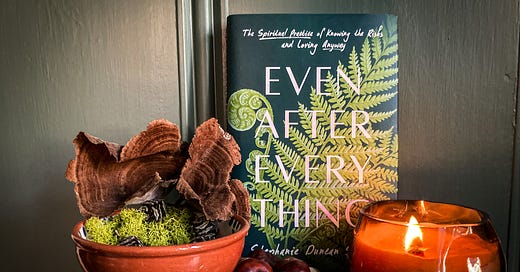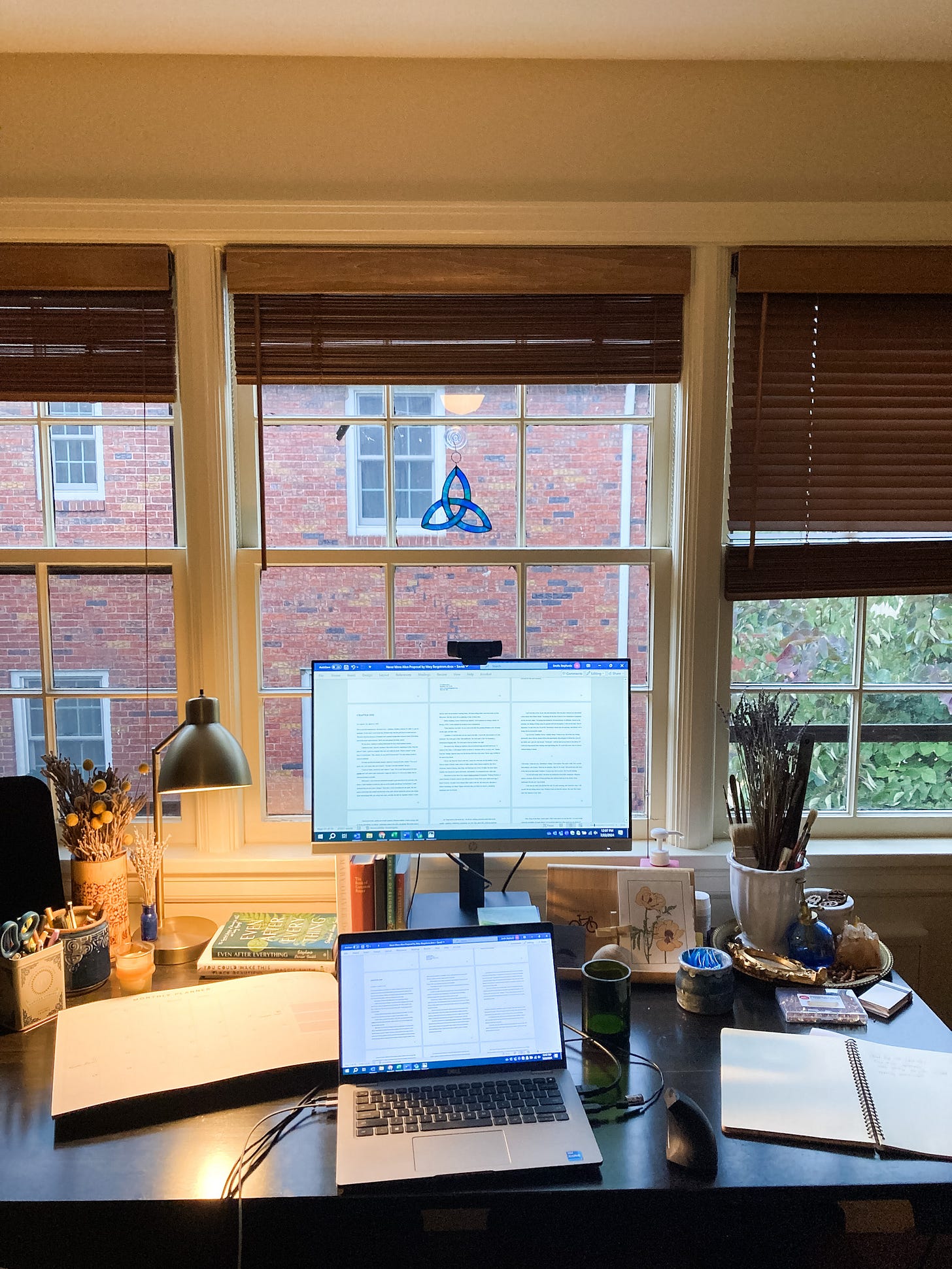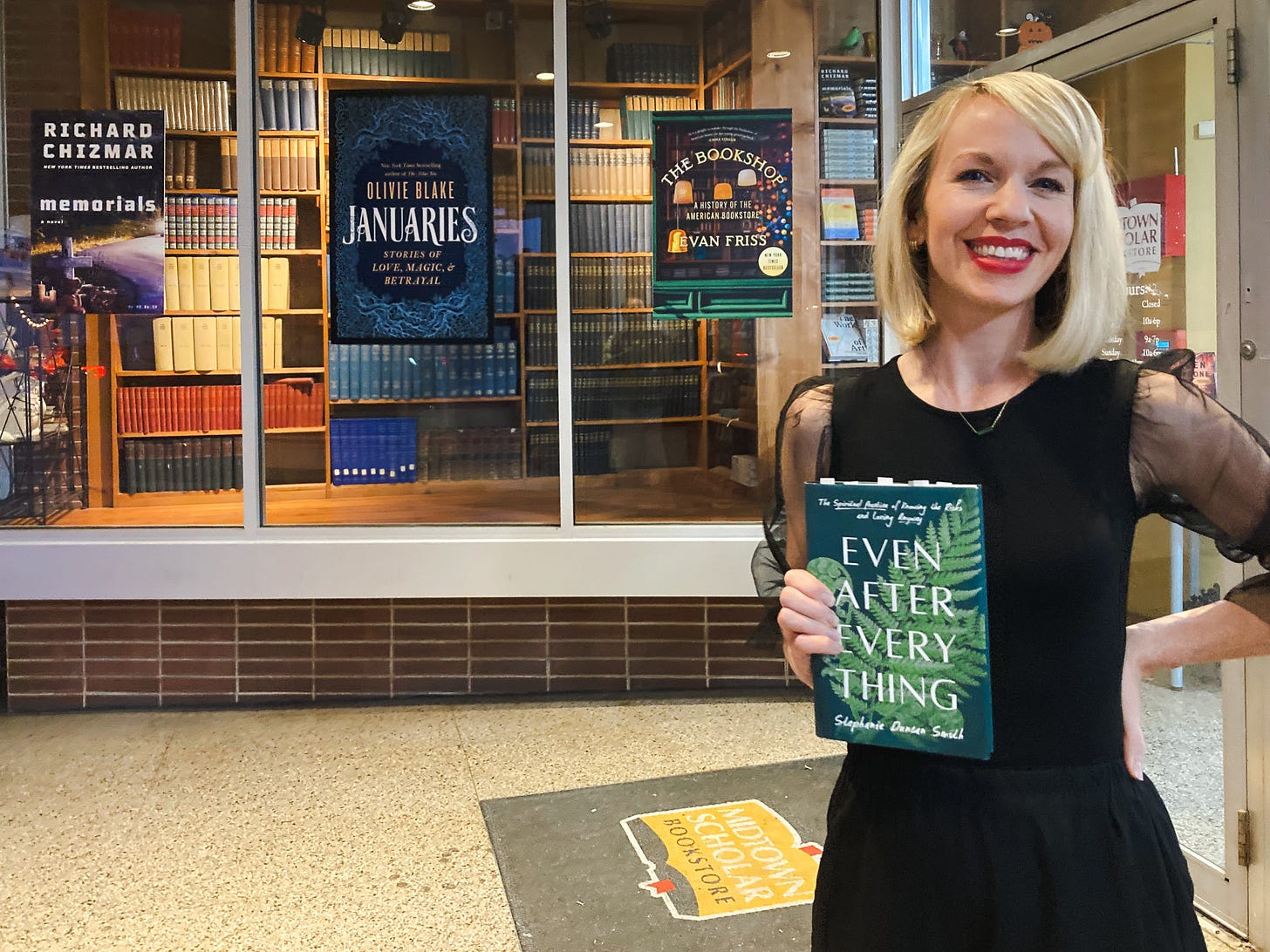Mothers Creating in the Margins: An Interview with Stephanie Duncan Smith
"Good art comes from our willingness to be changed, surprised, bewildered."
If you were to ask me when I began following Stephanie Duncan Smith’s work, I’d likely offer a blank stare and a shrug. Forever? I cannot, for the life of me, recall where or when I stumbled across her writing for the first time. I can only recall this: I was hooked from the first word. For years and years, I’ve quietly tucked away her wisdom and encouragement, saving bits and pieces of her pep talks for rainy days. She is the kind of writer I aspire to be, the kind of writer who—on the deepest level—values craft. It is my joy and honor to pick her brain today, as part of a (very sporadic and not at all consistent) interview series on mothers creating in the margins. Enjoy! And be sure to order Even After Everything, if you haven’t read it yet.
You recently made the jump from editor to author. What surprised you most in that role transition?
Everyone has heard the book-as-baby metaphor but no one talks about the release era as postpartum, at least that I've heard. It’s almost laughable how this revelation came to me post-release—a professional editor writing about the embodiment and metaphor of new parenthood!
Speaking for myself, the book release was so very postpartum. It’s called a book release for a reason. This message that’s burned inside of you for so long is set loose to a life of its own, this is good and right and worthy of celebration, as much as it is vulnerable and terrifying. As any kind of release, it’s exhilarating as much as it signifies total loss of control. I knew I’d need to be gentle with myself but I was surprised both by the aptness of the metaphor that I'd somehow missed before!
How has becoming a mother changed or influenced your writing practice?
When I wrote the birth story of my daughter in Even After Everything, my editor made a critical catch—as soon as she entered the scene, my first-person singular "I" sprang into second-person "you." Instantly, motherhood changed my narrative tense. It changed my personal sense of orientation.
As an introvert and medium-aggressive individualist, this expansion is so good for me. It stretches in all the right ways. I would never say that I had to become a mother to be stretched in this way, to the contrary, I'm embarrassed it took me so long to catch on to the true wonders of "we." But now that I am awake to them, I tend to the "we" in new ways—not just my kids and kin, but the interconnectedness of us all.
In Even After Everything, you write: “While Holy Saturday affirms the realness of human pain and waiting, Easter invites us to allow ourselves to be astonished by resurrection, even in a Holy Saturday world. Joy, like resurrection, requires a certain willingness to be surprised, confounded even. It asks us to say yes to bewilderment.” What role do you believe joy and bewilderment play in the creative process?
Your posture toward the creative process will always show in the work. If you approach the creative process from a posture of control, that’s not creating, that’s colonizing. If there’s no discovery in your writing, that’s not a creative act, that’s a book report. If there’s no risk in your creating, there’s probably not much joy, either.
The creative process asks to change us. It writes us as we write the page, in a gorgeous reciprocity that I believe makes creativity a true spiritual practice. The invitation is to a posture of surrender, out of respect that you are engaging a life force bigger than you, and this is a beautiful thing. Good art comes from our willingness to be changed, surprised, bewildered.
What poses the greatest barrier to your creativity in this specific season, and how are you working through it?
Probably overstimulation. I tunnel vision very well. I multi-task terribly. I try to close out my tabs at the end of the work day because otherwise they buzz in my brain and take up too much space. But mostly, in this gorgeous greening weather, I get outside and feel reborn. I take the dog out on my lunch, pull a couple weeds, and quite literally ground myself in new ways. When the minutiae and multi-tasks get me down, I get my garden boots on, and try to keep in touch with my good and right smallness on Carl Sagan’s “pale blue dot.”
One of my personal writing mantras came straight from you: “Root for your reader’s becoming.” (I still have that line written on a post-it note above my desk!) Do you have a personal writing mantra you could share with us?
I’m honored to be keeping you desk-side company! I have many mantras, but the one sustaining me now is Annie Dillard’s “Spend it all.” In my mind I hear this writer’s imperative in conversation with Joan Didion’s “Every day is all there is.” Meaning: Every day of this life is a special occasion and the writer’s vocation is to pay attention without hierarchy. Don’t wait for the perfect writing conditions. Don’t hold back because you’re afraid it’s not good enough or what will people think or you don’t feel ready. We’re never ready. Today is all there is. You might regret not going for something, but you probably won’t regret going all in on your creative practice.
And I’m not talking about publishing goals here. I’m talking about the words inside you that are burning for your attention and expression, whether in a private bedside journal or public essay.
The creative process asks to change us. It writes us as we write the page, in a gorgeous reciprocity that I believe makes creativity a true spiritual practice.
For anyone familiar with your writing, it’s evident that you read a lot. Do you have a system in place for recording books you’ve read, favorite quotes, etc? Either a commonplace book or something else?
I envy readers who have their systems! I don’t keep any lists. Mine is pure artifact: I buy the physical books and mark them up. I look at my bookshelves like some sit in front of a hearth fire: it calms me to see such familiar voices and stories flickering in my imagination.
I do keep key quotes in my iPhone notes which I like because they are searchable. But mostly, I am system-hapless. Maybe one day!
I often think of a piece you wrote back in 2021 called Your Work Is Worthy. Do you have any encouragement—specifically for mothers—on how they can dignify their work?
As someone who works a desk job, I have often loved the close of the day’s practice of swapping out my keyboard for a cutting board. My brain swims in words all day and it is deeply satisfying to hand the reins over to my body for a while instead—pressing garlic, dicing carrots, simmering something nourishing.
Motherhood is so intensely embodied in the early years that I think it can be just as much a haven to give your body a break and create space for the expression of your inner life.
It’s difficult to express yourself if you’re not in touch with yourself, and everyone deserves that. Moms of littles are in such close physical contact with our kids every day. You deserve to keep in touch, keep in contact, with the woman who is sustaining them, the woman who has been there long before she became a mom. You deserve to be sustained yourself. In these all-intensive years, it is a powerful thing to use your voice in first person and so practice your own personhood—a few sentences or syllables at a time.
If you’re not already subscribed to Stephanie, please remedy that ASAP. Some of my personal favorite posts from her archives:
And of course, a mini shameless plug for this interview 😉
Stephanie Duncan Smith is a senior editor at HarperOne who has spent her career developing award-winning and bestselling authors, and the author of Even After Everything: The Spiritual Practice of Knowing the Risks and Loving Anyway. She is the creator of Slant Letter, a bestselling Substack email newsletter for writers looking to deepen their craft and do it in style. Duncan Smith completed her master’s in theology at Western Theological Seminary, where she was the winner of the Frederick Buechner Prize for Excellence in Writing. She lives with her husband, Zach, a professor, and their two children in Harrisburg, Pennsylvania.
If you enjoyed this post, you might also love my book, Create Anyway. Grab it at Amazon, Barnes & Noble, Bookshop, or directly through Baker Book House.









Immediately bought her book after reading this interview and am absolutely loving it-such interesting writing structure and gorgeous poetic language!
I discovered Stephanie's Substack blog last year and am low-key obsessed. Love this interview!